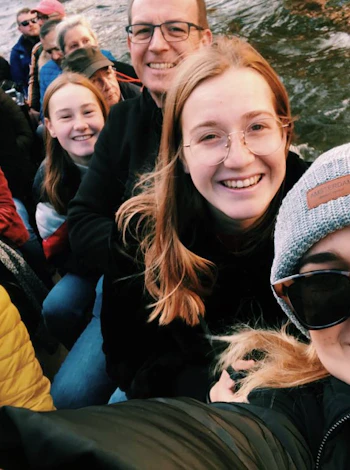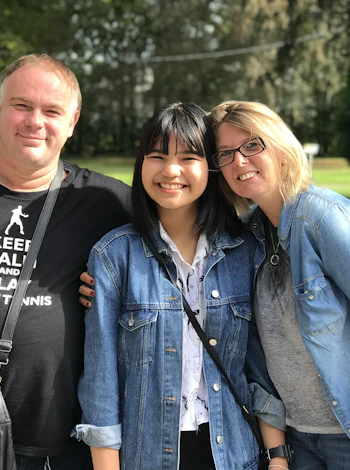High school exchange program
in Belgium
Live the life of a Belgian teenager, becoming part of a local family and studying at a Belgian high school.













Experience life in the heart of Europe
Student exchange program in Belgium
Belgium is a small, fascinating country in the heart of Europe, a crossroads of different people portraying the essence of the Old Continent but with a modern, innovative twist. This unique blend is reflected in Belgian cities, from large cosmopolitan centres to picturesque countryside towns, from medieval architecture to art nouveau, not to mention the eccentric murals decorating the walls of several cities.
The Belgian people is just as varied, but on of their distinctive share traits is a playful sense of humour, a sense of warmth and hospitality that reminds you of home. Discover this true European gem!

A small country of immense richness
Balade
In Belgium, the word "balade" means a stroll or an outing, usually outdoors. A relaxing, unhurried trip to enjoy the surroundings, whether it be nature (such as the beautiful rural landscapes and coastline) or one of the many urban centres. Go on as many "balades" as you can to discover the hidden treasures of Belgium!
What’s high school like in Belgium?
Multiculturalism
Similarly to Australia, Belgium is a highly multicultural country, a mix of cultures, languages and traditions, and this is reflected in local schools. Meeting several cultures, customs and beliefs daily will make you feel like a true citizen of the world!
Quality
Belgian schools rank amongst the best in the world, especially in the science field. Known for its high standards, experiencing the Belgian education system first-hand during your exchange will be incredibly beneficial.
So many languages
French, Dutch and German are the three official languages of Belgium, even though the locals speak many more. This linguistic diversity will be an endless source of learning and discovery.
Sport and activities
Belgians value sports and physical activity: from jogging in the park, to rock climbing or team sports. Join your classmates and challenge yourself! Conviviality, especially through activities shared with friends and family, is a staple of Belgian society.
A small country of great beauty. Let it surprise you!
Choose authenticity – trust WEP and prepare to be amazed.
On a WEP Classic program, you will experience the most authentic side of Belgium. You may be placed anywhere in the country, depending on the location of the host family who has chosen you to share this incredible adventure with.
Volunteer host family
Public school
Placement anywhere in French-speaking Belgium
Short-term, semester or year programs available
Your host family during your exchange year
Gain a second family – they can’t wait to welcome you into their lives!
Here is why:
Belgian families have a lot to offer and one of their social traits is the inclination to be welcoming and hospitable. You’ll feel right at home.
The Belgian traditional family... does not exist! Leave aside all expectations and be prepared to discover new family dynamics, it's all part of the adventure.
You will slide into the routine of a Belgian family and share their daily life. Iconic celebrations, outdoor activities, local cuisine... their customs will soon become yours.


Your school in Belgium
Find out more about your school experience in Belgium
Belgian students begin their educational journey at the age of 6, attending primary school (which is compulsory) until they turn 12. A peculiar aspect of Belgian primary schools is that there are no textbooks; students are given simple sheets or cards, to assist with progressive learning.
Junior and senior secondary school are combined into one and welcome students aged 12 to 18. In Belgium, secondary schooling aims at preparing students for higher education or for entering the workforce. For this reason, students can choose between different programs depending on their end goals.
The Belgian education system
The first cycle of studies focuses on general knowledge, with compulsory subjects such as French, Dutch or German (depending on the school and the area within the country), maths, science, history, geography and sport.
In the second cycle, the goal is to allow each student to explore their talents and areas of interest. Students can therefore specialise in their chosen field, be it humanities, literature, business, social sciences...
Subjects in Belgium
Senior secondary school in Belgium consists of four grades, with the last year being optional and aimed at students who wish to continue with higher education:
- Quatrième (15-16 years old)
- Cinquième (or Poésie) (16-17 years old)
- Sixième (or Rhétorique) (17-18 years old)
- Septième (optional) (18-19 years old)
Belgian secondary school
Generally speaking, Belgian schools don’t offer many extra-curricular activities. If you wish to play a sport or try a recreational activity, the best thing to do is research a club or sports centre in your area, with the help of your host family or coordinator.
School in Belgium is demanding and local students are committed to their studies. Make the most of your free time to try new activities and make friendships in the community, including outside of your host school.
Extra-curricular activities
The academic year starts on the last Monday of August, and ends in late June. Throughout the year, there will be several school breaks, including two weeks at the end of October, and time off at times like Christmas, Carnival, and Easter.
A typical school day begins at 8:00 am and ends around 15:30, with a one-hour lunch break.
The school calendar in Belgium
Academic performance in Belgium is assessed in a very different way to Australia. The grading system is typically numerical and ranges from 0 to 20, where the highest score you can achieve is 20 and the minimum passing score is 10.
Grades in Belgium
Stories from students and parents who have been there
Here are the testimonials of families who have chosen WEP for their exchange experience.
Join one of our upcoming events
to learn everything there is to know
about our high school exchange programs!
Going with WEP is best
Since 1988, a wide choice of destinations and comprehensive assistance before, during and after your overseas program. WEP is the ideal partner for your big overseas adventure.
Like you, we also get to choose who we travel with: our schools, host families and overseas partner organisations are carefully selected.
We offer a custom-made insurance policy, specifically designed for our participants, and we have a solid network behind us.
Emergency assistance, overseas and from Australia, is available 7 days out of 7, 24 hours a day, 365 days a year.
Allowing all our participants to live their desired overseas experience is a mission, a challenge we're thrilled to accept.
FAQ
Your host family, local coordinator and your host organisation will provide you with support while you are overseas. WEP Australia will remain in contact with the host organisation and your parents to coordinate and support your experience. In case of an emergency, both you and your family will be able to call an emergency phone number that is answered 24/7.
You will be advised of your placement location, host family and host school as soon as feasible. This can range from a few months prior to departure, right up until departure, as a lot needs to happen behind the scenes before each student's placement process is complete and can be communicated to you with certainty. The placement process doesn't only include sourcing a suitable host family, but also finding availability at a local school, and completing all red tape (including, for example, lenghty criminal history checks in some countries). Prior to departure from Australia, all students will receive host family, host school and local coordinator details.
Independent travel is not permissible while on exchange. However, you will be able to travel with your host family, school, host organisation and other community groups such as sporting teams or scouts. Again, the foremost aim of the program is educational, and your priority for any holiday periods must be your host family, who will be investing a lot of time, energy and money into this experience - simply in return for your frienship and positive contribution to their household.
Generally speaking, overseas schools won't issue a diploma to exchange students who are only there for a short time and don't graduate at that school. You may however be provided with a honorary certificate, as well as a WEP certificate of completion, which however don't count towards credit or graduation in Australia.
Language experience is desirable, but not necessary, for most countries. However, some countries have mandatory language requirements. You'll find the specific requirements for each country listed on its page. Intensive language courses may, in some circumstances, meet language pre-requisites. WEP strongly recommends language preparation prior to departure as language knowledge is of enormous benefit in assisting you to quickly adapt to your new family, school and life.
Of course, there are English-speaking destinations available if you are not interested in learning another language.
No, it's the host families who choose the student they wish to invite into their home. Based on the documents you will submit as part of your WEP application, one lucky family will choose to open their home and hearts to you, which is why for all Exchange Classic programs, and many Flex programs as well, there is no avenue for students to choose a specific location.
It may be possible to live with an overseas family that you already know (excluding relatives of the student). However, the family will have to be screened and approved, prepared and supported by our partner organisation in the same manner as any other host family. School enrolment must also be available.
More questions?



